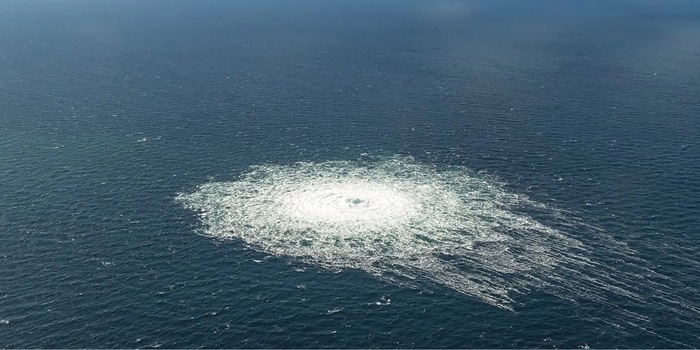
North Stream sabotage without major consequences for the climate
Methane is one of the most potent greenhouse gases. But the explosion of the Nord Stream pipelines released less than was feared.
On 28 September, several detonations destroyed three of the four Nord Stream pipelines. As a result, gas flowed into the Baltic Sea and subsequently the atmosphere for days. The methane released in particular is a powerful greenhouse gas, which is why there were fears of consequences for the climate as well as political and economic ones. A study by Xiaolong Chen and Tianjun Zhou of the University of the Chinese Academy of Sciences in Beijing in Advances in Atmospheric Sciences alleviates at least the latter concern. . While this is the largest known release of methane in a single man-made event, the amounts are comparatively small compared to total global emissions of the gas, the two researchers write. In total, according to their estimates based on satellite data, 0.22 million tonnes of methane entered the atmosphere, twice as much as the previous leader, an accident in 2015 at California's Aliso Canyon gas field. Chen and Zhou's figure is well below the 0.5 million tonnes estimated in the first days after the Nord Stream pipelines were sabotaged.
However, the gas leak must be considered in relation to the total annual emissions of methane: On average, 70 million tonnes of the greenhouse gas were released into the atmosphere annually from the oil and gas sector between 2008 and 2017. Together with emissions from rice fields, landfills or cow stomachs, as well as from natural sources, 360 million tonnes of methane escape into the atmosphere. Therefore, only as much gas escapes from Nord Stream as is otherwise released every day by other sources. "The additional warming caused by the emitted methane is so minimal that it would not be noticed on a global scale," says Chen.
Nevertheless, the physicist warns, "If humanity is to achieve the goals of the Paris climate agreement, damage to infrastructure such as this should be avoided." Even though methane lingers in the atmosphere for a much shorter time than carbon dioxide, its greenhouse gas effect is more than 80 times greater over a 20-year period. Over a period of 100 years, the effect is still 30 times greater. Reduced emissions are therefore urgently needed to limit global warming to less than two degrees Celsius.
Spectrum of Science
We are partners of Spektrum der Wissenschaft and want to make sound information more accessible to you. Follow Spektrum der Wissenschaft if you like the articles .
Originalartikel auf Spektrum.de
Titelbild: © Danska Forsvaret / TT Nyhetsbyrån / picture alliance (Ausschnitt)
Experts from science and research report on the latest findings in their fields – competent, authentic and comprehensible.
From the latest iPhone to the return of 80s fashion. The editorial team will help you make sense of it all.
Show all